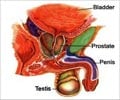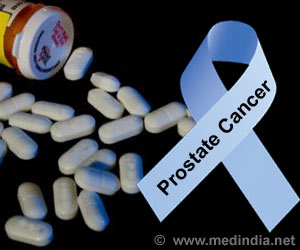
‘A novel drug that could target the epigenetic mechanisms may be able to combat the deadly form of prostate cancer.’
Tweet it Now
The research study was published in Cancer Cell.A newly discovered epigenetic mechanism could lead to the development of castration-resistant prostate cancer. A novel drug identified could target this epigenetic mechanism and will be able to combat the deadly form of the disease.
Uncontrolled activity of male hormones, called androgens, contributes to the development of prostate cancer. One of the primary ways doctors treat prostate cancer is by inhibiting the activity of androgens by either surgically removing the testicles or with drugs that decrease androgen levels or activity.
Unfortunately, even though most patients have early success with anti-androgen treatments, many patients eventually develop metastatic castration-resistant prostate cancer within two to three years. Castration-resistant prostate cancer is more difficult to treat and cure because scientists are unsure how it develops resistance to anti-androgen therapies.
"Undoubtedly, the foremost reason for transient effectiveness of the androgen deprivation therapy is a poor understanding of the molecular mechanisms driving progression to castration-resistant prostate cancer, which in turn has hampered development of new therapeutics," explained Nupam P. Mahajan, PhD, associate member of the Chemical Biology and Molecular Medicine Program at Moffitt.
Advertisement
This modification was specifically accomplished by androgen receptor protein with the help of ACK1 around the region of the androgen receptor gene! This results in high levels and activity of the androgen receptor even when prostate cancer cells have been treated with anti-androgen therapy.
Advertisement
They discovered that the ACK1 inhibitor blocked epigenetic modification of the androgen receptor gene and decreased its levels and activity. Importantly, the ACK1 inhibitor blocked the growth of prostate cancer cells that were resistant to the anti-androgen drug enzalutamide (also known as XTANDI) and decreased the growth of castration-resistant prostate tumors in mice.
"This discovery is highly relevant because almost two thirds of castration-resistant prostate cancer patients do not respond to enzalutamide. Overall, (R)-9bMS opens up as a new, and desperately needed, therapeutic option for those castration-resistant prostate cancer patients who either do not respond to enzalutamide or have acquired resistance, post-treatment," said Dr. Kiran Mahajan, the first author of this paper.
Source-Eurekalert













